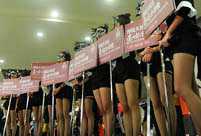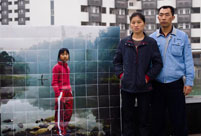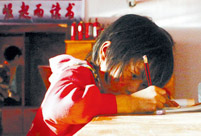When French artist Prune Nourry decided to document China's missing daughters, those never born due to gender preferences, she drew inspiration from one of the country's most recognizable symbols: the Terracotta Warriors.
For her installation, "Terracotta Daughters," on display now at the Magda Danysz Gallery in Shanghai, the artist created 108 life-sized sculptures of schoolgirls in the style of the ancient warriors.
"I feel it is important to bring light to a subject that affects us all, especially in the years to come," she said, adding that the work invites people to ponder the issue through a reinterpretation of a familiar symbol.
One Chinese woman, who asked to remain anonymous, was filled with emotion at the sight of the army. She could not control her tears when she saw the schoolgirls lined up, saying that the exhibit resonated with her own past and social conditions as a woman in China.
"Terracotta Daughters" is a continuation of Nourry's previous series, "Holy Daughters," an examination of the gender imbalance in India. The 108 sculptures in the Shanghai exhibit are molded after eight Chinese orphan girls the artist met through an NGO called The Children of Madaifu.
Founded in 1999 by Marcel Roux, the charity in central China offers help to orphans and children left behind by migrant worker parents.
The artist used Chinese clay and the same techniques used in making the Terracotta Warriors to create the sculptures with assistance from local craftsmen in Xi'an, where the original Qin Dynasty sculptures are located. Like the Terracotta Warriors, each of Nourry's sculptures is unique.
"I learned a tremendous amount about the highly developed artistic techniques of the time through my collaboration with the local Xi'an craftsmen," she said.
"The warriors are a national pride, but also a powerful symbol I chose as inspiration for my project," she added.
The artist noted the number of single men has been increasing ever since the 1980s, and that "combined, China and India total more than one third of the globe's population, and both encounter a similar gender imbalance."
The male to female ratio at birth has hovered at a high level since fetal ultrasound exams became common in China in the 1980s.
"Technology and research in recent years have allowed us to make tremendous progress in our evolution. But it can also be misused, like ultrasound technology, made to monitor the fetus's health, is used to select the sex," said the artist.
However, she acknowledged the progress that China has made in efforts to alleviate the gender imbalance through law enforcement and public campaigns.
Latest official figures show that China registered a sex ratio at birth of 117.7 boys for every 100 girls in 2012, marking the fourth year of decline.
Retirement programs established by the government for the elderly population are also helping, as parents no longer have to worry about having a son to care for them as they grow old.
"Steps such as these are crucial in restoring a natural equilibrium to the ecosystem," she said. "I try to contribute in my own way to help bring awareness."
Kang Mingming, director of the gallery, said the "Terracotta Daughters" display will be exhibited in Shanghai until the end of October and will then be shown in Paris, New York and Miami.
 Annual airshow kicks off in Houston
Annual airshow kicks off in Houston U.S. Navy Carrier Strike Group stages military exercises
U.S. Navy Carrier Strike Group stages military exercises Volkswagen showcases new energy vehicles in Beijing
Volkswagen showcases new energy vehicles in Beijing  Different eye catching shows at housing fairs in China
Different eye catching shows at housing fairs in China Special family portraits call attention to left-behind children
Special family portraits call attention to left-behind children Migrant children’s pain and joy in city
Migrant children’s pain and joy in city Lingerie show dazzles Wuhan Motor Show 2013
Lingerie show dazzles Wuhan Motor Show 2013  Running in fun customs at Beijing Int'l Marathon
Running in fun customs at Beijing Int'l Marathon  Weekly Sports Photos
Weekly Sports Photos Unveil PLA air force base
Unveil PLA air force base  World has never been dark-- a blind kid’s life in Tibet
World has never been dark-- a blind kid’s life in Tibet Oriental education or western education?
Oriental education or western education? China in autumn: Kingdom of red and golden
China in autumn: Kingdom of red and golden Pet costume competition
Pet costume competition Chinese screen goddesses from Beijing Film Academy
Chinese screen goddesses from Beijing Film Academy Day|Week|Month